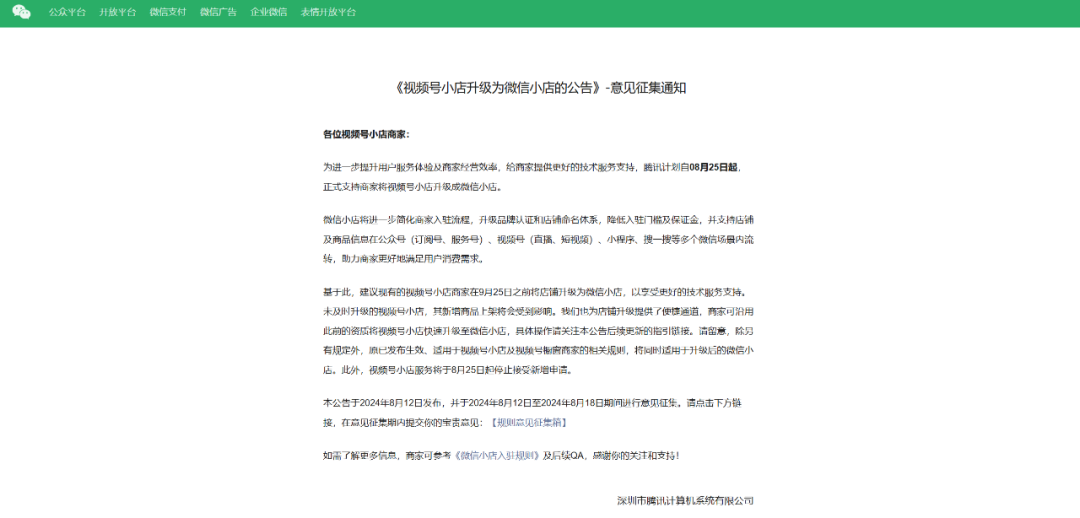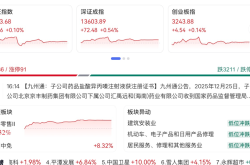WeChat Store is launched, and Tencent's redo of e-commerce is not just about e-commerce
![]() 09/03 2024
09/03 2024
![]() 595
595
Is Tencent's new hope for e-commerce in WeChat?
On August 25, following the previously announced "Announcement on Upgrading Video Account Stores to WeChat Stores," Tencent required merchants to upgrade their Video Account Stores to WeChat Stores. Merchants who fail to upgrade promptly will see their ability to list new products affected.
Overall, there are two key points to note about this upgrade:
First, in terms of access scenarios, the WeChat Store supports the circulation of shops and products across multiple scenarios within the WeChat ecosystem, including official accounts (subscription accounts, service accounts), video accounts (live broadcasts, short videos), mini-programs, and search functions, with future expectations of access through apps and web pages outside of WeChat. In other words, the WeChat Store will provide comprehensive access to the entire WeChat ecosystem's traffic.
Second, the threshold for merchant entry has been further lowered, allowing individual business owners to directly open WeChat Stores, and even supporting merchants who meet certain conditions to trial operate with a zero-deposit guarantee. Tencent has also provided a convenient channel for store upgrades, allowing merchants to quickly upgrade their Video Account Stores to WeChat Stores using their existing qualifications. Additionally, the Video Account Store service will cease accepting new applications from August 25th.

This provides significant convenience for small and medium-sized merchants who have not yet ventured into video accounts or have weak video account operation capabilities but want a piece of the WeChat e-commerce pie. Previously, there was an industry analogy for the traffic characteristics of WeChat e-commerce: Doing business on WeChat is akin to continuously drilling wells in a large oil field, with wells dug in official accounts, mini-programs, communities, and video accounts. The oil field is vast, and while wells can be connected by pipelines, the connections are not always smooth. With the launch of the WeChat Store, the scattered e-commerce traffic in various scenarios within the WeChat ecosystem will be connected. Improving the connections between wells will inevitably enhance the fluidity and efficiency of the entire oil field. In simpler terms, information and product flows within the WeChat ecosystem form a closed loop within the WeChat Store. In Tang Chen's view, this amounts to Tencent restarting its e-commerce business. WeChat's move clearly conveys two messages: First, video accounts have become more interconnected, and the WeChat Store penetrates the WeChat ecosystem, serving as a passport for merchants. Second, e-commerce's status within WeChat has further increased, becoming Tencent's new hope for its e-commerce business, but Tencent's ambitions extend beyond just e-commerce. At present, it appears that Tencent still wants to make money from e-commerce. Reports indicate that the WeChat e-commerce ecosystem strategy based on the WeChat Store is being led personally by "Father of WeChat" Zhang Xiaolong. "WeChat Store" was also the first name given to WeChat e-commerce by Zhang Xiaolong 10 years ago.

At that time, after consolidating its e-commerce businesses such as Yixun.com and Paipai.com into JD.com, Tencent launched the "WeChat Store" on WeChat official accounts, but the results were not significant. In 2020, the WeChat Store was discontinued and replaced by the mini-program "WeChat Mini Store," offering functions such as product sales, order logistics, customer service, and mini-program live broadcasts. In reality, this was just one example of Tencent's oscillating stance on e-commerce. As early as 2005, Tencent ventured into e-commerce with the launch of Paipai.com, just two years after Taobao and when JD.com was still in its early stages and known as "JD Multimedia." Since then, Tencent has been continuously active in e-commerce, often described as "failing repeatedly but persevering." Public records show that in the past four years alone, Tencent has attempted multiple e-commerce projects, including "Xiaoe Pinpin," "Tencent Huiju," and "Yun Guang Quanqiu." Within the QQ ecosystem, similar to WeChat, Tencent has also launched its e-commerce platforms such as "EMan Upin" and the mini-program "QQ Store," but most of these ended in either cessation of operations or announcement of transformation. For example, the QQ Store was announced to be discontinued in 2023, even before its trademark was approved.
With social traffic that rivals envy, Tencent has struggled for years to establish a viable business model. This frustration has led to industry jokes about Tencent lacking e-commerce genes, with the sentiment that "Tencent can't learn e-commerce." When WeChat opened its doors to JD.com, Pinduoduo, and Meituan, Tencent became more of an operator, serving as a traffic conduit. While this may have been frustrating for Pony Ma, objectively speaking, under the influence of traffic dependency and flushing, WeChat e-commerce has gained new possibilities. It is evident that Tencent's recent e-commerce layout has focused on WeChat, with video account e-commerce taking precedence. This year alone, video account e-commerce has been particularly active, implementing initiatives such as the "Butterfly Plan" to grade influencers, encouraging merchants, influencers, and brands to join and start live-streaming sales. In May, WeChat internally restructured its organization, integrating the video account live-streaming e-commerce team into the WeChat Open Platform (mini-programs, official accounts, etc.) team, directly under the supervision of the head of the WeChat Open Platform. This move resolved conflicts of interest within the WeChat e-commerce ecosystem and further integrated video account live-streaming e-commerce into the WeChat ecosystem, fostering closer connections with mini-programs and official accounts. Tencent has also mobilized resources across business groups to support video account e-commerce. In July of this year, Tencent CDG (Corporate Development Group) optimized and adjusted certain functional segments of its AMS (Advertising and Marketing Services) division, primarily involving teams engaged in live-streaming operations and commercial governance.
After the adjustment, the AMS business line now encompasses not only traffic acquisition and digital marketing services for merchants but also partial support and services for video account transactions. Until the video account's push for the "WeChat Store," Tencent's approach changed, aiming to elevate the entire WeChat e-commerce logic by shifting from a decentralized, point-based e-commerce layout to a top-down design that integrates various e-commerce projects within the WeChat ecosystem through the WeChat Store, creating synergy. From Tencent's perspective, the current upgrade of the WeChat Store is imperative. With video accounts growing and generating significant revenue, it would be impossible for Pony Ma not to be tempted. After years of setbacks in e-commerce, Tencent is driven by a desire to succeed in this space and generate revenue. It's akin to raising fish for years in a visibly fertile pond before finally building a dam to catch them.
At the 2024 WeChat Public Class earlier this year, Tencent disclosed that the GMV (Gross Merchandise Volume) of video account live-streaming sales nearly tripled in 2023, with video account orders surging by over 244%, and GPM (Gross Profit Margin per Thousand Impressions) exceeding RMB 900. According to LatePost, the estimated GMV of video account e-commerce in 2023 was RMB 100 billion. Meanwhile, the monthly and daily active user counts of video accounts have surpassed those of Kuaishou and are close to those of Douyin. The latest financial report shows that in the second quarter of this year, the total user time spent on video accounts increased by over 20% year-on-year. Video accounts have contributed to Tencent's growth in e-commerce, online advertising, financial technology, and enterprise services.
For example, online advertising revenue for the quarter was RMB 29.871 billion, a year-on-year increase of 19%, primarily driven by growth in video account and long-form video revenue. Industry professionals have estimated that the current video account ad load rate is around 5%, compared to 15-20% for other platforms. According to KASI data, the commercial content load rate of Douyin (TikTok's Chinese version) has nearly reached its upper limit (15%) in 2023. During critical periods like Singles' Day, the commercial content fill rate of Douyin can even reach 30%. As explained by Tencent President Martin Lau during the second-quarter earnings call, live-streaming e-commerce continued to grow steadily this quarter. Compared to other short video platforms, Tencent has not seen a slowdown in its total gross merchandise volume growth. The primary reason is that, compared to competitors, Tencent's e-commerce transaction volume is relatively small and has significant room for growth.
If we use Douyin e-commerce and Kuaishou e-commerce as references, this growth potential is in the range of trillions of RMB. This time, Tencent's repositioning of video accounts and elevating video account e-commerce to the height of the WeChat ecosystem is about carving out a piece of the pie. However, this may also be a quick profit for Tencent in e-commerce, as the space is relative to Tencent's own e-commerce volume. In the broader e-commerce industry context, the growth rates of platforms like Douyin, Kuaishou, Taobao, and JD.com have significantly slowed, and the basic incremental growth in the e-commerce industry has largely been divided up.
Looking further ahead, Tencent's ambitions extend beyond just e-commerce. Commenting on WeChat Store's moves, Gong Haihan, founder and CEO of video account service provider Bai Zhun, said that this time, WeChat has a clear vision from top to bottom about what form of e-commerce is most suitable for its ecosystem. However, the gap between having a clear vision and successfully implementing it in e-commerce operations is significant, requiring significant catch-up work. Past failures in Tencent's e-commerce endeavors have left many merchants and industry insiders cautious: Can video accounts, which carry the "hopes of the entire village," succeed in e-commerce?
When video accounts intensified their efforts in live-streaming sales in 2023, the market widely believed that they were "crossing the river by feeling the stones of Douyin." In reality, WeChat e-commerce at that time already encompassed various forms such as social e-commerce, content e-commerce, and private domain e-commerce. Its "algorithm + social" traffic distribution mechanism, based on acquaintances, made it impossible for video account e-commerce to achieve the same level of extreme commercialization as Douyin, underscoring the importance of user experience in WeChat e-commerce compared to other platforms.
The failed e-commerce endeavors of QQ offer a lesson: having traffic does not mean "doing whatever one wants." Currently, WeChat exercises extreme restraint, maximizing the balance between e-commerce efficiency and user experience. In other words, while WeChat e-commerce may learn from Douyin and JD.com, it will not repeat the old path of "selling traffic." WeChat prefers that merchants or brands operate long-term and that creators continuously produce high-quality content to better meet users' content consumption needs. This explains why there has not yet emerged a super head influencer like Li Jiaqi or Crazy Little Brother Yang on video accounts. Sources close to Tencent have told the media that "overall, the traffic distribution mechanism on video accounts will be fairer, more inclusive, and based more on content quality, without favoring large influencers in terms of traffic." Whether from an investment or long-term operation perspective, investing in traffic may not be a suitable strategy for small and medium-sized merchants.

Today, the commercialization of video accounts is returning to WeChat's foundation: "Even the smallest individual has their own brand." This regression can also be understood as Tencent stepping back from its positioning of video accounts and repositioning them as short video content platforms. In this context, e-commerce is one way for video accounts to monetize their traffic. However, within the WeChat ecosystem, e-commerce has taken a significant step forward. This advance and retreat represent a broader strategic move by Pony Ma. He also explicitly stated at the annual meeting earlier this year that the key for Tencent is not to follow others but to combine its unique strengths to create short videos for acquaintances. Pony Ma's greater ambition lies in upgrading video account e-commerce to build a new business foundation and create WeChat's "e-commerce ecosystem." His confidence stems from WeChat's foundational data. Tencent has reported that WeChat has 1.371 billion monthly active users, with total user time spent on mini-games exceeding 30% year-on-year and total user time spent on mini-programs increasing by over 20% year-on-year. During the second-quarter earnings call, Martin Lau stated that the live-streaming e-commerce business had been repositioned "to be more like WeChat e-commerce."
In this system, WeChat is not just building an ecosystem based on video accounts or live broadcasts but rather "constructing the e-commerce ecosystem within WeChat, connecting it to the entire WeChat ecosystem, which will undoubtedly continue to receive support from official accounts and live broadcasts." He further explained that this is somewhat similar to Tencent's mini-program ecosystem. "For years, the mini-program ecosystem may not have generated significant revenue, but when its potential is unleashed, the massive user participation creates enormous value for online and offline merchants and content providers, becoming a significant revenue source in many different fields, including mini-games. This will also be Tencent's model for developing WeChat e-commerce." In this light, while Tencent is navigating the short video e-commerce landscape by learning from its peers, strengthening the WeChat ecosystem and creating an "e-commerce ecosystem" is the path Pony Ma desires most. This presents a meaningful challenge for both Tencent and the entire Chinese Internet industry.
Reference materials:
Zhaibo, "WeChat Store Launched, Time to Revisit WeChat E-commerce"
E-commerce Online, "Can the Resurrected WeChat Store Fulfill Pony Ma's E-commerce Dreams?"







